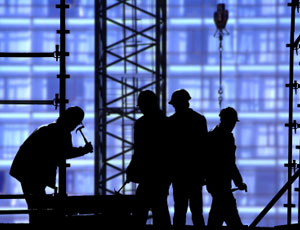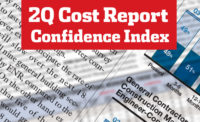For the first time, in the nine quarters that ENR has been conducting the Construction Industry Confidence Index survey, executives at the nation�s largest construction and design firms see the light at the end of the tunnel.

Industry Optimism Finally Improves
The seemingly boundless optimism of the construction industry has been sorely tested over the past two and a half years. The market recession that hit nearly every market in every region of the U.S. has cast a pall over the industry, which has seen projects and opportunities dry up, firms large and small fall by the wayside and unemployment rates in the trades rise to over 20%. The mantra for recovery has been “Wait till next year.”
But amid this gloom, a new sense of hope is beginning to appear in the industry, according to the most recent ENR Construction Industry Confidence Index survey. The CICI for the first quarter of 2011 rose dramatically to 51 on a scale of 100, from 43 last quarter. This uptick represents the first time since ENR began measuring industry sentiment in March 2009 that the CICI has risen above 50, which suggests a stable market. The 679 executives of large construction and design firms responding to the survey believe the market has bottomed out and recovery will begin this year.
What is the CICI?
The CICI measures executive sentiment about the current market and projections for where it will be in the next three to six months as well as over a 12- to 18-month period. The index is based on responses to surveys sent out to more than 3,000 U.S. firms on ENR’s lists of the leading contractors, subcontractors and design firms. The latest results are based on a survey conducted from February 28 to March 14.
Market Rebound Expected by an Increasing Number of Firms
This quarter, 32% of all respondents say the market continues to decline, down from 45% in last quarter’s survey and 63% in the third quarter of 2010. However, respondents who believe the markets will be improving three to six months from now outnumber those who believe market declines will continue by a 25% to 21% margin.
Respondents were very confident of a market rebound in 2012, with 59% saying the market will be improving in 12-to18 months, while only 8% think it will continue to be in decline.
Applying the CICI formula to individual market sectors, respondents felt that, while the private-sector markets remain sluggish, the recession may be bottoming out. Many participants commented that project financing remains a problem, but the CICI in most of the developer-financed sectors rose. For example, the commercial office sector, still the lowest-ranked sector, rose to 37 from 29 on the CICI scale.
Sectors With Improved CICI Ranking
The strongest markets were in the power sector (a CICI rating of 71), and the industrial and manufacturing sector (66). Other building sectors with improved rankings include:
- Retail (42)
- Hospitals and heath care (67)
- Distribution and warehouses (47)
- Hotels and hospitality (46)
- Entertainment (44)
- Multi-unit residential (55)
The multi-unit residential ranking is particularly notable because this is the first time that sector has ranked in positive territory since the CICI survey began in 2009.
Private Financing Is Improving, but Public Funding Is Perceived to be Problematic
The growing feeling that the slide in the privately financed project market may be easing suggests the credit crunch may be ending. While 27.6% of respondents said they believed client access to credit continues to be a problem, 51.8% said the availability of credit has stabilized, albeit at a low level, and 20.7% said credit restrictions are beginning to ease.
On the other hand, some buildings markets that are heavily reliant on public funding fell in the CICI scale. The K-12 education sector dropped a point to 45, as did higher education, which fell to 54. The infrastructure markets also declined on the CICI scale, with transportation down two points to 48 and water and sewer down two to 55.
This drop in confidence is evidence of state and local government budget deficits around the country. Many respondents say state and local agency budget deficits have affected project starts, with 35.2% saying that publicly funded project starts were off by up to 10%; meanwhile, 24.3% said publicly funded project starts were off by more than 10%. Only 8.7% say that public projects starts were up during the last six months.
Greater Confidence Boosts Hiring
A major bright spot revealed by the survey is that 37% of the firms indicated that they plan to add to staff in 2011, while only 16.1% say that they are contemplating additional staff reductions. This is a major change from the previous three years, which has seen construction layoffs result in an industry-wide unemployment rate of over 20%.
The survey also asked what qualities or experience firms were looking for in new hires:
- Experience in building information modeling was mentioned by 70 firms.
- Estimating skills were mentioned by 60 firms.
- Project management experience was cited by 59 firms.
- Experience with green building techniques and LEED compliance was mentioned by nearly 50 firms.
Material Prices
Materials prices also are a concern to the CICI survey respondents. This quarter, 80.3% of respondents said they saw some price pressure on materials and equipment. Of the 439 executives that said specific materials were on the rise, steel was mentioned by 242, while copper was mentioned 159 times. Fuel and petroleum products were mentioned by nearly 150 survey participants



Post a comment to this article
Report Abusive Comment